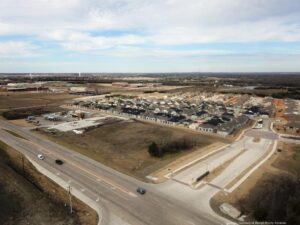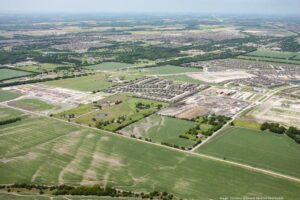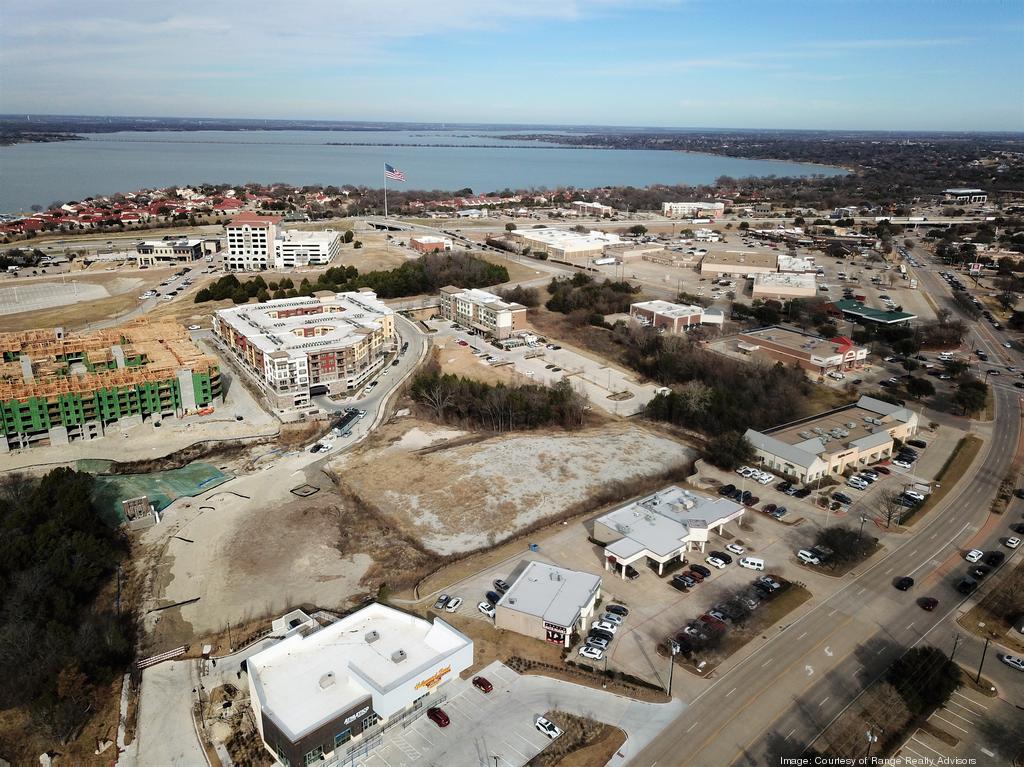“We see the bottom being in the first half of 2023 as developers and investors settle into new pricing, construction pricing will start to come down, and we get a clearer picture of where rates will go over the next 12 months,” said Tom Dosch, principal at Dosch Marshall Real Estate.
Dosch and other North Texas commercial real estate land brokers discussed the state of the market – from land prices to who 2023 buyers will be to when the market will rebound – in the roundup that follows:

Range Realty Advisors works with build-for-rent and convenience store developers, such as this NexMetro + 7 Eleven project.
Cooper Eddy, founder, CRE Land Group:
In my experience, when the market has challenges, land prices tend to plateau versus drop while things stabilize. Landowners tend not to feel pressure because they may have an ag tax exemption in place, as well as may not have debt.
Land deals will close in 2023, and to what extent on the development side will depend on the capital markets and cost of materials. If the cost of materials comes down in 2023, as we all hope for, we’ll see the financing side start normalizing.
Carter Kendall, senior vice president, CBRE:
Residential land remains in a holding pattern. There are too many economic variables that are keeping homebuilders and lot developers on the sideline. I expect these land buyers to start contracting more land in mid-2023 with the caveat that most contracts will be a pipeline hedge for 2025.
In other words, there will be no real expectation of land closings until better sales and velocities are realized. If the data trends in the right direction, we will start to see land trade in late 2023, with expected lot deliveries in the second quarter of 2025.
Thomas Pearson, executive vice president, Colliers International:
The 2023 land buyer could likely be the developer who may have private or foreign capital sources, has a build-to-suit tenant who is willing to commit to leasing a new building at the rate necessary to make the project financeable, or a user who wants to build and own their own building.
The 2023 buyer could also be an investor who has private funds or 1031 funds to invest and is willing to purchase the land at a price the investor deems satisfactory and would allow that entity to wait until economic conditions change so they can either re-sell the land or build a project.
We see continued demand for large-scale sites by users who are having to look for land that is probably two years out before being ready to build.
All the infill sites have been picked over, and the established submarkets are almost fully developed.
We continue to look at emerging markets and areas once considered far out which are now considered part of the DFW MSA, i.e., areas like Denton, Forney, Midlothian, Cleburne, Aledo, Sanger, and of course, we are still very high on southern Dallas County.

A look at Foster’s Crossing in the City of Anna provided by Dosch Marshall Real Estate.
Dillon Cook, chief executive officer, Range Realty Advisors:
Cautiously optimistic seems to be the common consensus within the DFW commercial real estate market as we enter 2023.
DFW remains fairly insulated as a CRE market leader through steady in-migration and corporate relocation activity. Still, with today’s interest rates and high construction costs, we’re rebounding as quickly as the market will allow.
Optimism and activity certainly seem to be on the rise as compared to Q3 and Q4 of 2022, and we continue to see strong activity in the build-to-rent, multifamily, and industrial sectors.
We expect that the single-family sector will take a bit longer to rebound from the aforementioned, but once rates do eventually begin to subside, we expect to see builders aggressively seeking new lot inventories.
All in all, the majority of our clients are being much more selective on their new land pursuits as opposed to the land-rush phenomenon that we all experienced in 2021.
Tom Dosch, principal, Dosch Marshall Real Estate:
Anytime there is a market correction, price is the first question that gets brought up.
We see landowners being slow to adjust their pricing in a down market.

Tom Dosch is principal at Dosch Marshall Real Estate.
Well-located tracts are often owned by well-capitalized family offices or institutions that do not have to sell and, therefore, can hold in a down market. This means that often rather than pricing being discounted, transactions in core areas significantly diminish.
For some landowners, carry costs – i.e., debt, taxes, etc. – their overall portfolio, debt coming due, or partnership structure will force them to have to sell even in a down market. For there to be a general re-pricing in the market, it takes time, and it takes offer activity from buyers to reset landowner pricing expectations and then closings at those lower numbers to become a price comparable.
In a market the size of DFW, there will be certain core sub-markets that will be more immune to a reduced price across the market, and there will be other more tertiary markets that will see pricing discounted.
Due to interest rates and inflation, we started to see transaction activity slow down summer of 2022, and that resulted in several re-trades and dropped transactions in the second half of the year.
The dropped deals came from seller’s not willing to work with buyers, holding firm at pricing and terms.
Those seller’s that did need to sell took a price reduction to get a deal done in the current market.


